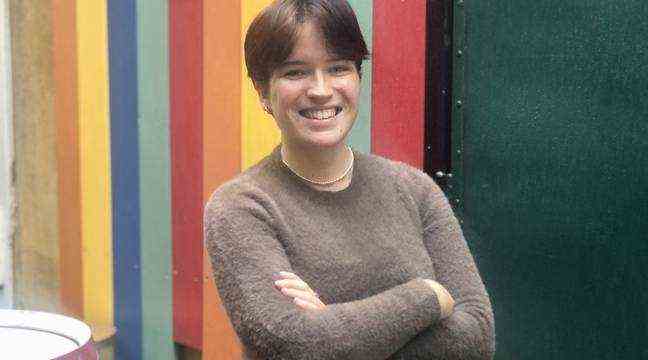Charlotte Langlais, 22 years old from Nantes, is aphantasy. This future English teacher, whose brain does not work like that of the majority of people, decided to write a book and set up her association to bring together all those who live with this little-known peculiarity, difficult to describe and understand. . She confided in 20 minutes.
What is aphantasy?
It’s not imagining things the way most people do. I never have a picture or sound in my head. It’s the same with smells, tastes, touches: I have a blind imagination. If I ask you to close your eyes and think of an apple, you can imagine its shape, its texture, the noise when you bite… It’s impossible to do that, I can’t see anything, not even a word! I’m just thinking of an apple.
How’s it going for memory?
My memories are not impacted but resemble a mental list of facts and emotions. For example, if I think back to the New Year’s Eve last year, I know I was in London, that I was happy, but I have no image of people I was with, of music that the we played… For the dreams, I don’t really know how, but I know that I do, even if I have no image.
You have lived 21 years without realizing this difference …
I was hanging out on Youtube and stumbled across a video last year. I did not understand anything because until now, I did not imagine that people thought differently! At first it was a shock, we can’t find the answers because there is very little research. I started to read everything that existed, and I found it fascinating, although today I cannot explain everything that is going on in my head.
What do we know, scientifically?
Researchers interested in it say it’s a different way the brain works. Not a lack or a failure, just neurons that do not work the same. It has just been proven that it is hereditary, moreover I taught my mother and my uncle that they are it thanks to the test of the apple! This word, aphantasia, comes from the Greek “phantasia” which means mental images or appearances. It was only installed in 2015. Between 3 and 5% of the population would be affected but in my opinion, it is much more.
What is the point of knowing that?
I explained a lot of little things about my behavior, for example the fact that I never notice physical changes: a haircut, a piercing… Everything that is artistic too, I love it but I am very bad: j I stopped playing the guitar because I didn’t understand when my teacher told me to hear notes in my head to play them. At school, everything was fine except for my horror for geography maps, with colors, arrows… The learning methods should be better adapted. Me, I have a technique all my own: I redo the course as if I were the teacher, to relive it.
Are there any positives?
I think I am much more anchored in the present: the past is super blurry so I rarely go back to it, and I am unable to visualize myself in the future. Suddenly, I rarely leave in my thoughts, because they are not alive enough to make me drop out of a conversation. I also think that aphantasies live a little better with breaks or separations, because apart from via photos or videos, and I take a lot of them, we have fewer images. The day before a stressful event, I tell myself I’m scared but I have nothing concrete that will keep me awake, so I fall asleep very easily.
You recently released a book and started an association …
Since I found very little writing, I did a quiz to measure the gaps between aphantasies (found via newsgroups, including Reddit) and those who aren’t. I received over 500 responses! I self-published my book without any pretense while in lockdown, in the hope that people would recognize themselves. One of them, Matthieu, contacted me and we talked a lot about making aphantasy known in France. We created an association “Aphantasia club” and an Instagram account. The goal is to advance research and bring people together. We are already receiving a lot of testimonials from people, some of whom feel alone and experience it less well than us.

